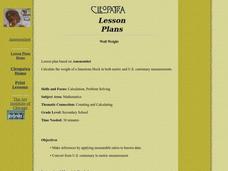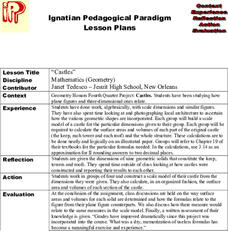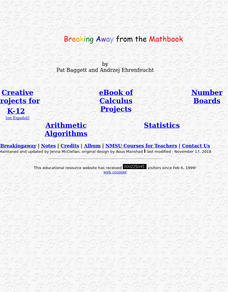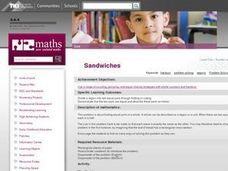Curated OER
Patterns
Fifth graders explore patterns. In groups, 5th graders participate in a "Pasta Pattern" activity. Given a bag of pasta, classmates sort pasta by shapes. They use pasta pieces to model different patterns. Students complete a bean...
Curated OER
Alternative Alphabet
Students determine and compare hieroglyph content and frequency to an alternative alphabet based on symbols that mimic sounds of the alphabet.
Curated OER
Coin Content
Students calculate ancient Greek coin values as compared to their weight, and equivalence in grain. They then determine their worth today. They convert metric to U.S. customary weight systems.
Curated OER
Measuring a Mummy Case
Students practice how to calculate volume using mummy cases. They measure using ancient Egyptian, U.S., and metric systems. They explore how to convert measurements into different systems, and discuss ratios.
Curated OER
Sculpture Shapes
Pupils reconstruct an ancient Greek sculpture using various geometric forms and explore different geometric forms. They create an abstract human form out of geometric shapes and create other representations out of the same shapes.
Curated OER
Wall Weight
Eighth graders calculate the weight of a limestone block in metric and U.S. customary measurements. Make inferences by applying measurable ratios to known data.
Curated OER
Underwater Excavation
Students calculate artifact size and ship capacity based on the excavation of an ancient Roman shipwreck.
Curated OER
Flip a Coin
Students are introduced to the concept of probability. In groups, they make a prediction about how many times a coin might show heads or tails when flipped. They carry out the experiment and record their results to compare it to their...
Curated OER
Castles
Students create a scale model to a castle using the dimensions they were given. They calculate the surface areas and volumes of each section of their castle.
Curated OER
Reading Trees: Understanding Dendrochronology
Students examine tree-ring dating and discuss the lack of water the settlers in Jamestown faced. They create paper tree rings, simulate rain patterns, and describe the history of construction paper tree sequences.
Curated OER
Dog Salmon Lesson Three
Students observe patterns and scale sizes on the salmon skin. They explore the tanning of salmon skills and practice the Athabascan terms for the salmon parts. They make salmon skin prints.
Curated OER
Language Arts: Women in History
Students read excerpts from Amelia Earhart's autobiography, "The Fun if It," and identify her character traits. To aid visualization of her transatlantic flight, they search books and the Internet for photos related to Earhart's flights....
Curated OER
Fraction King Lesson Plan
Students combine imagination, block manipulation, and computer applets to investigate fractions.
Curated OER
A Rounding Review
Fourth graders review rounding to the nearest ten, hundred, and thousand with this fun lesson centered around a visit to the computer lab.
Curated OER
Using The Calculator
First graders use a calculator to total money quantities. They use plastic coins to represent the cost of an entire purchase. Students model specific dollar amounts and how to make change.
Curated OER
Now You See Me, Now You Don't
Second graders develop an awareness of the power of their minds to work with visual images. All the activities in this unit help strengthen visualization that is an important tool or process in Geometry.
Curated OER
Wings and Othe Things
Learners work in groups that are engaged in different activities at different times. They watch the video "Madagascar" and collect data pertaining to the Fish Eagle's arm spam. They work together to perform mathematical computations...
Curated OER
Chambered Nautilus
Students create sets of similar triangles which, when fixed together with a piece of Scotch tape, form a spiral-like, segmented shape, slightly similar to the cross section of the shell of a nautilus.
Curated OER
Team Puzzles
Fourth graders work in co-operative teams of four to complete a puzzle. Each student initially works independently, and then the team jointly puts together the four shapes they have individually made, to complete the puzzle.
Curated OER
Sandwiches
Young scholars are introduced to the problem by thinking of all the ways 2 of their classmates could share a peanut butter sandwich. In pairs, students work describing their ideas. They then keep a record of all the different ways they...
Curated OER
Legs in the Barn
Pupils listen to the problem being read. They then brainstorm possible approaches and are encouraged to plan ways of recording their work so that others examine what they have done and share their findings.
Curated OER
students rotate through four workstations that reinforce the concept of symmetry
Second graders, in pairs, use arrays to explore the relationship between multiplication and division.
Curated OER
Using Tens Frames for the Strategy of Bridging to Ten
Second graders are given a problem. They are shown a fixed frame of 9 and students are asked to say where the six more should go without touching the tens frame. Students are invited to answer the question and show go they got the answer.























